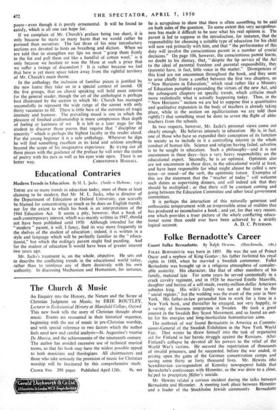Educational Contraries
Modern Trends in Education. By M. L. Jacks. (Andr..w Melrose. ics.) THERE are so many trends in education today, most of them at least claiming to be modern, that Mr M. L. Jacks, who is director of the Department of Education at Oxford University, can scarcely be blamed for concentrating as much as he does on English trends ; nor for the extent to which his book is an interpretation of the 1944 Education Act. It seems a pity, however, that a book of such contemporary interest, which was mainly written in 1947, should not have been published until 1950 Although intended for the " modern " parent, it will, I fancy, find its way more frequently to the shelves of the student of education ; indeed, it is written in a style and language which will be perfectly familiar to the "educa- tionist," but which the ordityry parent might find puzzling. And for the student of education It would have been of greater interest two years ago.
Mr. Jacks's treatment is, on the whole, objective. He sets out to describe the conflicting trends in the educational world today, rather than to reinforce any of them decisively with his own authority. In discussing Mechanism and Humanism, for instance, he is scrupulous to show that there is often something to be said on both sides of the question. To some extent this very scrupulous- ness has made it difficult to be sure what his real opinion is. The parent is led to suppose in the introduction, for instance, that the responsibility for choosing a suitable type of education for his child will now rest primarily with him, and that "the performance of this duty will involve the conscientious parent in a number of crucial decisions." On page 106, however, the conscientious parent learns, no doubt to his dismay, that, "despite the lip service of the Act to the ideal of parental freedom and parental responsibility, they (parents) have, in fact, little voice in the matter." Divergencies of this kind are not uncommon throughout the book, and they seem to arise chiefly from a conflict between the first two chapters, on "New Horizons in Education," which read rather like a Ministry of Education pamphlet expounding the virtues of the new Act, and the subsequent chapters on specific trends, which criticise much more realistically what is actually happening today. Thus, in the "New Horizons" section we are led to suppose that a quantitative and qualitative expansion in the body of teachers is already taking place, while in the section on egalitarianism we are told (how rightly!) that something must be done to arrest the flight of abler teachers from the schools.
In two respects, however, Mr. Jacks's personal views come out clearly enough. He believes intensely in education He is, in fact, one of those who have so expanded their conception of its function in society as to include in it a controlling interest in the whole conduct of human life. Science and religion having failed, salvation is to be sought in education. Such a philosophy—and it is not uncommon in these days—lays a very heavy responsibility on the educational expert. Secondly, he is an optimist. Optimists also are not uncommon in these days, in the educational world at least, and have been responsible for what might almost be called a new tense—or mood—of the verb, the optimistic future. Examples of this are the statement that the "teacher of today" will welcome such duties as supervising dinners, and will indeed ask that they should be multiplied ; or that there will be constant coming and going between the Education Committee and other local government committees.
It is perhaps the interaction of this naturally generous and enthusiastic temperament with an irrepressible sense of realities that has produced so inconclusive a book ; and yet, for that very reason, one which provides a truer picture of the who!e conflicting educa- tional scene than could ever have been achieved by a strictly






































 Previous page
Previous page